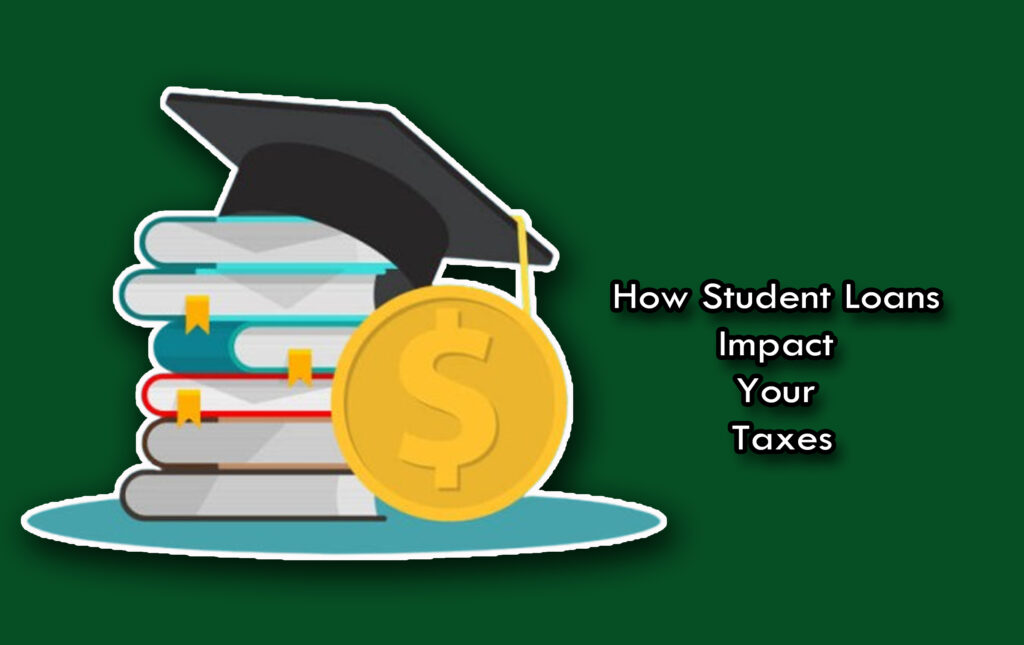How do student loans impact my taxes? As a student loan borrower, you are likely no stranger to financial stress. But do you know that your student loans can impact your taxes?

From deductible interest to potential task credits, understanding how student loans affect your taxes can help you minimize your refund.
However, it is no doubt that student loans are good when it comes to funding your education. But repaying after school can be financially stressful as there are other responsibilities to take care of.
Well, there is a way you can lessen your stress by using tax credits. Yes, when you begin to repay your loan, there might be a tax break. So, if you’re still schooling, you can explore available tax credits.
Hence, in this blog post, we will look into and examine how student loans can impact or affect your taxes. Stick with us to be enlightened.
How Does Student Loans Impact Your Taxes?
Student loans can impact your taxes in different ways. They include:
Student Loan Interest Deduction
If you paid interest on a qualifying student loan, you may be able to deduct up to $2,500 of the interest paid, even if you don’t itemize deductions.
This deduction can reduce your taxable income, which can help lower your tax bill. However, this benefit is subject to income limits, so high earners may not qualify for the full deduction.
Loan Forgiveness And Tax Implications
Under some income-driven repayment plans, remaining loan balances may be forgiven after 20-25 years of payments.
While forgiven amounts are typically considered taxable income, certain programs, like Public Service Loan Forgiveness (PSLF), may allow for tax-free forgiveness.
This can make a big difference in tax liability, especially if a large portion of your debt is forgiven
Employer Contributions To Student Loans
Some employers now offer student loan repayment assistance. Under current tax laws, up to $5,250 in employer student loan contributions can be excluded from your taxable income, potentially reducing the amount of tax you owe.
Tax Implications For Married Filers
If you’re married, filing jointly or separately can impact your student loan payments, especially under income-driven repayment plans.
Filing separately might reduce your payment amount by considering only your income, but it can also reduce other tax benefits. Deciding which filing status to use requires evaluating both tax implications and student loan payment impacts.
Education Tax Credits
If you’re still in school, education credits like the American Opportunity Tax Credit (AOTC) or the Lifetime Learning Credit (LLC) might be available, which could offset taxes owed. However, you can’t claim both a credit and a deduction for student loan interest in the same year.
The above are some of the major ways student loans impact your taxes and knowing these ways enables you make informed decisions financially. However, it’s often considered a good decision when you consult with a tax professional to minimize benefits based on your situation.
Student Loan Interest Tax Deduction
Student loan interest tax deduction is meant to help you reduce your taxable income. However, whether your interest will be reduced or not depends on how much interest you have paid so far during the year.
But, you do not need to itemize to get a deduction on your student loan interest tax, and this is because it is an above the line deduction.
How To Qualify
If you want to eligible for the student loan interest tax deduction, there are several criteria you must meet. They include:
- You must have paid the interest on your student loans.
- Marriage filing should not be part of your filing status.
- You must be legally responsible for paying the interest on your student loan.
- You must have a modified adjusted gross income that’s below the threshold set by the IRS yearly.
However, if you have covered the interest on your student loan, you will get a 1098-E from your loaner.
Bottom Line
Knowing how student loans affect your taxes can help you save money. Interest deductions, loan forgiveness, and tax credits can all make a difference. Also, talking to a tax professional can help you get the best benefits for your situation.



